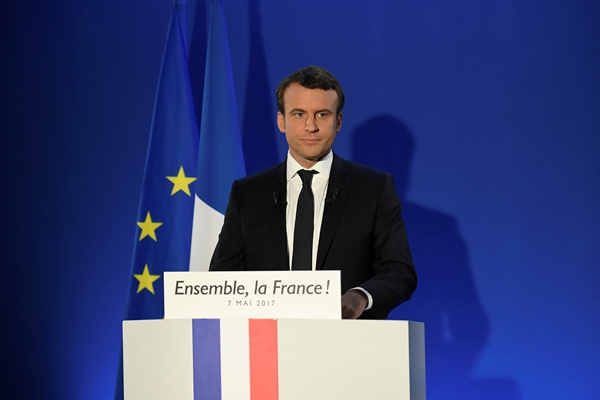EU ready to move forward with China after French election
 |
|
French President-elect Emmanuel Macron delivers a speech at his campaign headquarters after early results in the second round in the 2017 French presidential election in Paris on Sunday. Lionel Bonaventure / Reuters |
Sunday's convincing win for Emmanuel Macron in the French presidential elections provides the EU with an opportunity to shake off its populist blues and move forward with a new unity of purpose. The Macron win was important because he was by far the most pro-EU candidate arguing that what France needed was more European integration, not less. It is no surprise that his victory was especially welcomed in Brussels.
The re-launch of the European project will not be possible before the German elections in September. But it matters little whether Angela Merkel or Martin Schulz is elected as both are solid pro-European centrist politicians. In the intervening five months you can expect a flurry of activity between Berlin, Brussels and Paris as politicians and officials work out how best to re-launch the EU that has been floating aimlessly for the past couple of years.
The reasons for the EU's malaise were the triple shock of the Greek financial crisis, the rise of populism and Brexit. The Greek crisis has been contained and the government in Athens has been granted further loans by the IMF and the EU. The fact that the European economy is showing signs of renewed growth has helped open the coffers.
The defeat of Marine Le Pen in France and Geert Wilders in the Netherlands is a good sign that populism has peaked and is now falling. The rise of populist parties was closely linked to the refugee crisis but this is now under control and their support is dropping. The EU has also pushed back against the policies of some populist governments (Poland and Hungary) which demonstrate that Brussels is still prepared to defend the core values of the EU.
Brexit was of course linked to the populist movement. "Take back control" was an appealing if meaningless slogan that helped the Brexiteers to victory in June 2016. The British vote was a huge shock to the political elites in Europe and occasioned much soul-searching. But oddly it has pushed the 27 member states closer together and reinforced their desire to strengthen the EU. At a succession of meetings in Bratislava, Rome and Brussels the 27 have shown a steely determination to stay united and negotiate Brexit as one. Brexit is a classic lose-lose situation but the UK may be a bigger loser than the EU.
This new confidence in the EU can be seen from its determination to stand up, with China, in support of globalisation and the multilateral system. Worried at the noises coming from the US Donald Trump administration, the EU has reinforced its determination to uphold the Paris climate change agreement and forge ahead with free trade agreements.
Brussels welcomed President Xi Jinping's Davos speech defending the fruits of globalisation. The EU now looks forward to the EU-China summit this year as an opportunity to further deepen relations. It hopes to give a push to the negotiations for a bilateral investment agreement which are viewed as a precursor to an eventual FTA. China also recognises the growing importance of the EU not only as a major market for its goods but also as a strong pillar of the multilateral system. The recent strategic dialogue meeting in Beijing between EU foreign policy chief, Federica Mogherini and State Councillor Yang Jiechi revealed a broad consensus on many global issues.
The EU is also a strong supporter of the Belt and Road Initiative. The over-arching principle of connectivity is a concept shared by the EU and China. Both sides are already working on a number of major infrastructure projects and more will be discussed at the Belt and Road Forum in Beijing. Several European countries have joined the Asian Infrastructure Investment Bank while China has joined the European Bank for Reconstruction and Development, which improves mutual understanding and transparency.
The Belt and Road Forum is an important sign of China's on-going commitment to a more global and connected world. In this endeavour the EU is a natural partner.
The author is director of the EU-Asia Centre in Brussels

























